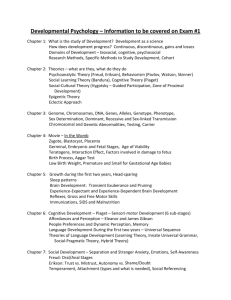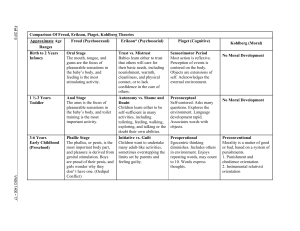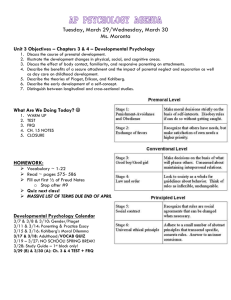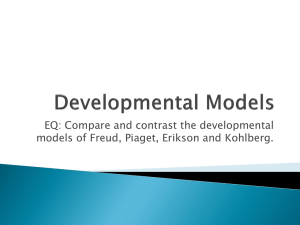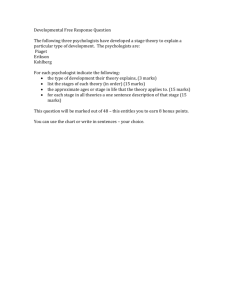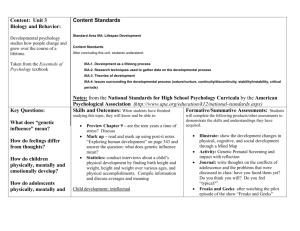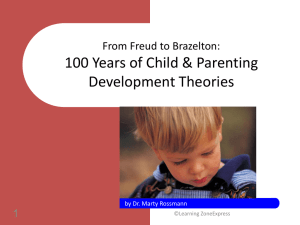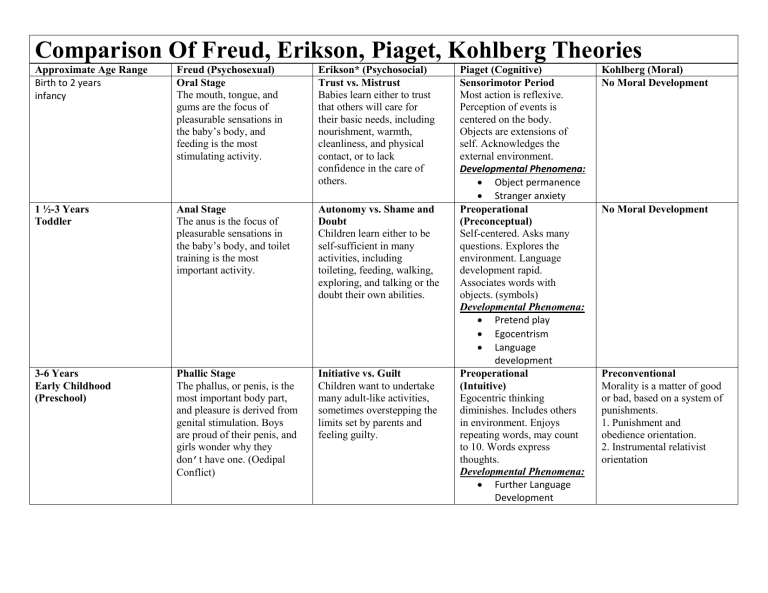
Comparison Of Freud, Erikson, Piaget, Kohlberg Theories Approximate Age Range Birth to 2 years infancy Freud (Psychosexual) Oral Stage The mouth, tongue, and gums are the focus of pleasurable sensations in the baby’s body, and feeding is the most stimulating activity. Erikson* (Psychosocial) Trust vs. Mistrust Babies learn either to trust that others will care for their basic needs, including nourishment, warmth, cleanliness, and physical contact, or to lack confidence in the care of others. 1 ½-3 Years Toddler Anal Stage The anus is the focus of pleasurable sensations in the baby’s body, and toilet training is the most important activity. Autonomy vs. Shame and Doubt Children learn either to be self-sufficient in many activities, including toileting, feeding, walking, exploring, and talking or the doubt their own abilities. 3-6 Years Early Childhood (Preschool) Phallic Stage The phallus, or penis, is the most important body part, and pleasure is derived from genital stimulation. Boys are proud of their penis, and girls wonder why they don’t have one. (Oedipal Conflict) Initiative vs. Guilt Children want to undertake many adult-like activities, sometimes overstepping the limits set by parents and feeling guilty. Piaget (Cognitive) Sensorimotor Period Most action is reflexive. Perception of events is centered on the body. Objects are extensions of self. Acknowledges the external environment. Developmental Phenomena: • Object permanence • Stranger anxiety Preoperational (Preconceptual) Self-centered. Asks many questions. Explores the environment. Language development rapid. Associates words with objects. (symbols) Developmental Phenomena: • Pretend play • Egocentrism • Language development Preoperational (Intuitive) Egocentric thinking diminishes. Includes others in environment. Enjoys repeating words, may count to 10. Words express thoughts. Developmental Phenomena: • Further Language Development Kohlberg (Moral) No Moral Development No Moral Development Preconventional Morality is a matter of good or bad, based on a system of punishments. 1. Punishment and obedience orientation. 2. Instrumental relativist orientation Comparison Of Freud, Erikson, Piaget, Kohlberg Theories Approximate Age Range 7-11 Years Middle Childhood Freud (Psychosexual) Latency Not a stage but an interlude, when sexual needs are quiet and children put psychic energy into conventional activities like schoolwork and sports. Erikson* (Psychosocial) Industry vs. Inferiority Children busily learn to be competent and productive in mastering new skills, or feel inferior an unable to do anything well. 12-18 Years Adolescence Genital Stage The genitals are the focus of pleasurable sensations, and the young person seeks sexual stimulation and sexual satisfaction in heterosexual relationships. Identity vs. Role Confusion Adolescents try to figure out “Who am I?” They establish sexual, political, and career identities or are confused about what roles to play. 18-40 Years Adulthood Freud believed that the genital stage lasts throughout adulthood. He also said that the goal of a healthy life is “to love and to work well.” Intimacy vs. Isolation Young adults seek companionship and love with another person or become isolated from others by fearing refection or disappointment. Generativity vs. Stagnation Middle-aged adults contribute to the next generation by performing meaningful work, creative activities, and/or raising a family, or become stagnant and inactive. 40-65 Years Middle Years Piaget (Cognitive) Concrete Operations Solves concrete problems. Begins to understand relationships such as size. Understands right and left. Cognizant of viewpoints. Developmental Phenomena: • Conservation • Mathematical Transformation Formal Operations Uses rational thinking. Reasoning is deductive and futuristic. Developmental Phenomena: • Abstract logic • Potential for mature reasoning Kohlberg (Moral) Conventional Level Morality seen as following the rules of society. Tries to be “good.” 1. “Good boy, good girl.” 2. Law - and - order orientation. Postconventional Morality consists of standards beyond specific group or authority figure. 1. The social contract orientation. 2. The universal ethical principle orientation. Comparison Of Freud, Erikson, Piaget, Kohlberg Theories Approximate Age Range 65 - Years Late Adulthood Freud (Psychosexual) Erikson* (Psychosocial) Piaget (Cognitive) Kohlberg (Moral) Integrity vs. Despair Older adults try to make sense out of their lives, whether seeing life as a meaningful whole or despairing at goals never reached and questions never answered. *Although Erikson describes two extreme resolutions to each crisis, he recognizes that there is a wide range of outcomes between these extremes and that most people arrive at some middle course. Criticisms Of Freud, Erikson, Piaget, Kohlberg Theories Freud (Psychosexual) Focus on sex Believed to place too much emphasis on sexuality. Sample Developed theories from on case studies based on the recollection of adult patients Gender bias Overall theory is biased toward males. Karen Horney proposed womb envy as a response to Freud’s penis envy theory. Phallic stage This stage in particular, including Oedipal and Elektra Complexes, is considered deeply flawed. Erikson* (Psychosocial) Sequence Do people have to pass through one stage to get to the next? Sample Theory developed based on study of males. Vague Erikson did not seek to was not explicit about what influences an individual to develop in certain ways or how the outcome of each psychosocial stage later influences personality Piaget (Cognitive) Research methods Observed his own children and small samples of children from well-educated, successful parents. Formal Operations Assumption that all children move into this stage, environment may play a role Underestimated abilities Egocentrism diminishes and theory of mind may develop earlier than proposed. The same may be true for other abilities. Kohlberg (Moral) Sample Kohlberg formed his theory based solely on male participants. Critical question: Reasoning or action? Where is someone who reasons one way, but acts another? Gender bias Carol Gilligan argued that this theory was based on justice, which favors males. Gilligan proposed a theory based on the ethics of care. Cultural bias Non-industrial countries may not reach levels 5 and 6; some moral concerns for other cultures are not represented in Kohlberg’s westernized sample.
